- Home
- Megan Mccafferty
Sixteen
Sixteen Read online
Table of Contents
Title Page
Dedication
Foreword
Infinity
Relent/Persist
The Future Lives of Emily Milty
Rutford Becomes a Man
The Grief Diet
Mona Lisa, Jesus, Chad, and Me
The Alumni Interview
Cat Got Your Tongue?
The Day I Turned Chickenhearted
Venetian Fan
Kissing Lessons
Nebraska 99
Cowgirls & Indie Boys
The Mud and Fever Dialogues
Fifteen Going On . . .
about the Contributors
Acknowledgments
about the editor
Also by Megan McCafferty
Copyright Page
For T.J., my best friend
(and first Writing partner) at sixteen
foreword
Megan McCafferty
Many readers have asked me why I wrote my debut novel about a sixteen-year-old girl rather than a character closer to my own age. There are a lot of answers to that question, from my obsession with books, movies, music, and TV targeted at audiences half my age, to the distinct possibility that I might have some (ahem!) unresolved issues about my high-school years.
Since I spend so much energy mining my teen years for material, I’ve come to realize that sixteen was the make-or-break age for me. It’s when I first started to believe that I would one day successfully escape the social stranglehold of my high school. I had big dreams about going to a great college somewhere far, far away—culturally and intellectually if not geographically—and doing something important with my life. Maybe I would write for the New York Times! Maybe I would star on Broadway! I was hopeful, knowing that there was more in this world than football games, proms, pep rallies, and other trivialities that dominate adolescent consciousness. Of course, the downside to my epiphany was that I had two more years of high school to get through before my “real life” could begin. At sixteen, I still hadn’t recognized that my “real life” could begin at any time.
While not every sixteen-year-old has shared my suburban New Jersey angst, fans’ fervent reactions to Jessica Darling’s cringe-worthy coming of age indicated that I certainly wasn’t alone. So one morning, after reading an e-mail thanking me for my unflinching depiction of the so-called sweetest birthday, it hit me: What about a book of stories about being sixteen years old? It seemed too simple, too obvious not to have been done before. Then I started to worry. Maybe the reason this anthology didn’t already exist was because turning sixteen is a big deal only for people who lack the maturity to just get over their high-school traumas already. Hmm.
To find out whether this was source material for a book, or fodder for a therapist, I sent out an e-mail to my fan list, asking the following question: What does being sixteen mean to you?
The inquiry clearly struck a nerve because the response was immediate and overwhelming. Within ten minutes, I had thirty-eight e-mails. Within twenty-four hours, I had just over 250. In all, I got more than 500 hilarious and heartfelt takes on what I’m now convinced is a universally tumultuous age. Younger respondents used dreamy language to describe what a magical, transformative year it would be for them. Older writers expressed the often disappointing reality. Twenty- and thirty-somethings described an inexplicable sense of nostalgia for a time that they know is more fondly remembered than actually lived. Together, the responses were funny, profound, and often contradictory—much like the age itself.
In their own (slightly edited) words, sixteen means you . . . are an acceptable age to go to second base . . . don’t have to lie about your age anymore when all the sketchy guys on the boardwalk come up to you and your friends . . . can go out on dates without your parents getting psycho paranoid about it . . . get into more than enough harmless trouble in back-seats . . . are tempted by sex, sex, sex, drugs . . . fit the cliché: sweet sixteen and never been kissed . . . feel strange in your own body . . . hope you’ll be transformed into this beautiful, popular person and that this new school year will be a fresh start . . . pray your face will clear and your bra size will increase . . . are the same as you were at thirteen, only an inch taller . . . have your license and are finally free! free! free! . . . are still too young to vote, buy cigarettes, or get into R-rated movies, but too old to jump into the ball pit at Chuck E. Cheese . . . can do anything, like running through an empty field screaming “I love Jelly Bellys” without anyone to stop you . . . can go into Sharper Image without adult supervision . . . still look up to Ariel the Little Mermaid . . . only get as much freedom as you earn from your parents . . . are young enough to goof off and old enough to have an opinion . . . are wondering, I’m sixteen, dammit, when does the fun start? . . . are stressed because college really matters and your grades really matter and everyone is on your freaking nerves . . . are halfway through high school and don’t know if that makes you happy or sad or both . . . learn that everything in life is not fun . . . hope people will start taking you and your views seriously . . . are legally allowed to work past seven P.M. and your employers take total advantage of it . . . are full of stupid emotions . . . have no clue what path you’re taking, but can decide what shoes to wear on the journey . . . still have to deal with your strict Italian father, who thinks he’s the law and can’t deal with the fact that you’re growing up . . . learn that people change and grow apart and aren’t always who you think they are and won’t do what you expect them to do . . . spend a lot of time expecting something great to happen, like meeting your soul mate or becoming rich . . . wonder if you’ll reflect on this part of your life and regret that you didn’t conform just to make things easier . . . don’t feel sweet at all . . . feel so girlie, in a good way . . . look back on life and realize it is time to look forward . . . know what’s out there and all the things you can do but you can’t do them or aren’t sure if you even want to . . . are getting older, and fast, and unfortunately your life still doesn’t have much direction . . . are in charge of things, or at least it seems that way . . . can finally say you’ve arrived—almost.
I wish I had room for all the responses. (Actually, that might make an interesting book of its own!) In essence, sixteen is a singular age—you have enough experience behind you to feel grown up, yet are all too often reminded of just how little you know. Sixteen captures this paradox through the distinctive voices of some of the most gifted authors writing for and about teens today.
Part of the reason I was so excited about this project was because I was eager to read others’ interpretations of the theme. Even though I asked for contributions only from authors whose work I admire, I must admit, I had no idea how this book would turn out. But I’m thrilled (and relieved!) that their stories are all smart, strange, and surprising.
The first two stories I acquired for the collection were Sarah Dessen’s take on virginity and driving and Steve Almond’s meditation on a teen love affair gone wrong. I was immediately awed not only by the gorgeous prose, but also by how different the stories were from one another. “Infinity” perfectly captures the high-pressure importance placed on hitting certain milestones—or not. “The Day I Turned Chickenhearted” is steeped in the kind of melancholy wisdom that—unfortunately—comes only after the fact.
Emma Forrest’s “The Grief Diet” is striking in its dark depiction of a friendship between two sixteen-year-old girls who are both wildly precocious yet naive. At its end, I was deeply worried about them both. Likewise, I finished Jacqueline Woodson’s “Nebraska 99” wanting to know why? why? why? this bright young narrator would take such risks with her life, knowing only too well that so many real-life girls make similar errors in judgment. On the flip side, I was thrilled for the
title character in Julianna Baggott’s “The Future Lives of Emily Milty,” a seemingly shy girl who emerges out of the shadow of her dynamic older sister. I was confident that she would find her way in the world.
“Cowgirls & Indie Boys” by Tanuja Desai Hidier is part of a much larger novel-in-progress about sexuality, language, and communication between cultures. I felt guilty as I cut it down to short-story length, and relaxed only when I realized that it would one day be available to read in its hypnotic entirety. With the story-in-verse “Cat Got Your Tongue?” I was amazed by Sonya Sones’s ability to capture so much—sibling love/hate, lust at first sight, the thrill and fear of that first time behind the wheel—in so few words.
Joseph Weisberg’s clever stories-within-a-story format in “Kissing Lessons” brilliantly reflects how there isn’t one monumental coming-of-age event in our lives, but a culmination of smaller moments that makes us who we grow up to be. Cat Bauer’s “Venetian Fan” portrays that common first-kiss-in-a-foreign-land fantasy more vividly and beautifully than any bad straight-to-video flick starring the Olsen twins.
Several stories hit me on a very personal level—I don’t doubt that they will do the same for you, only in different ways. “Relent/Persist” by Zoe Trope is the first story I’ve ever read that brought me back to the letters my husband and I wrote to each other as we hesitantly fell in love, when we wanted to tell each other everything but were afraid as to how the other would react to the revelations. In “Mona Lisa, Jesus, Chad, and Me,” Carolyn Mackler tackles sex, religion, and fading friendships in a totally honest, nonjudgmental way that made me sad about the friends I’ve lost along the way to adulthood. And though it deals with the budding love between two boys, “The Alumni Interview” reminded me of just how common it is at sixteen—or any age, really—to try to be someone you’re not. Fortunately, David Levithan’s story also drives home how liberating it can be to put an end to all the lies.
All the stories are unique, but two in particular defy convention. When Ned Vizzini first told me that his story, “Rutford Becomes a Man,” was going to be about sweet sixteen in the Wild, Wild West, I was like, “The hell?!” But Ned, through Rutford, proves just how timeless teen angst truly is. Rutford—like many tortured teens—is hilarious precisely because he’s trying so hard to be serious. And “The Mud and Fever Dialogues” by M. T. Anderson is a brilliant story inspired by the teachings of ancient philosophers. It deals with questions that contemporary teenagers still find themselves pondering late at night with friends: Who am I? What’s the point of anything? Furthermore, its antihero’s suicidal pursuit of truth is certainly relatable to anyone who has tried to stop a friend or a loved one from self-destruction. Anderson’s story pulverizes the boundary between “teen” and “adult” fiction in the spirit that defines this collection as a whole.
Finally, there is my story. “Fifteen Going On . . .” is a miniprequel to Sloppy Firsts about how Jessica and Hope spend— or rather, don’t spend—their final moments together before Hope moves away. I find it very difficult to comment on my own writing, so just flip to the last story in the book and read it for yourself.
I like to think that the range and depth of these stories make Sixteen an ideal present for anyone on that landmark birthday. (Hey, that certainly wouldn’t be bad for sales. . . . ) But with its mix of insight and nostalgia, this book, I hope, will also be discovered by parents who are trying to understand their kids, and by those readers in between who, like me, watch Sixteen Candles every time it’s on TNT and still wish that Jake Ryan would show up in his Porsche to sweep us off our awkward feet. Enjoy!
Infinity
Sarah Dessen
Lately I don’t dream about Anthony. I dream about the rotary.
Now, Mr. Haskell, my psychology teacher, would say this has implications. That somehow my fear of the rotary is linked to my issues with Anthony, which are both many and complicated. Mr. Haskell has a certain way he says things like this, leaning over with both elbows balanced on his lectern. It’s very unsettling, as if he can see deep into your soul. But the truth is, I was scared of the rotary before I even met Anthony.
Most people don’t even know what rotaries are. That’s because most towns have those most modern of inventions, stoplights, to deal with traffic. Not here. Instead, some genius decided however many years ago to put in this big circle, with all the main roads feeding into it, then sat back to watch people crash to their deaths as they attempted to negotiate it.
But I digress.
My first experience with the rotary was when I was about seven. We’d just moved to town so that my father could finally finish his dissertation. My mother and I were on our way to the grocery store when we suddenly came upon this big sign that said YIELD with an arrow pointing to the right. Cars were going around a big circle, off of which poked several different exits to different roads. The trick, apparently, was to kind of merge in, follow around until your exit, then merge out. Simple as that.
“Oh my God,” my mother said, poking her glasses up the bridge of her nose, which she always does when she’s really nervous. “What is this?”
The answer came in the form of a loud, impatient beep from behind us. My mother looked nervously to her left, then tentatively poked at the gas pedal, sending us inching out into oncoming traffic. Another beep.
“Mom,” I said.
“I’m merging!” she shrieked, as if this were on the level of splitting atoms and I was distracting her on purpose. And we were merging, pretty well, slowly easing into traffic. In fact, we were almost relaxed when we had to try to get back out; no easy trick, as there were many cars merging in. We got stuck on the inside track for two more turns, watching our exit go by, before my mother panicked and just sort of jerked the wheel, sending us in its general direction. And that was when the station wagon hit us.
The scene ensued the way you would expect: dents all around, tears (my mother), angry muttering (the guy who owned the station wagon), plus everyone else driving past rubbernecking and jawing to one another while I sank down as far as I could in the passenger seat, wishing there was a way to meld permanently with the pleather beneath me. The entire episode ended with a ticket, our insurance rates rising, and my mother swearing to never do the rotary ever again, which seemed somewhat overdramatic, until we realized that she meant it.
What this means, essentially, is that she has spent nine years taking the longest possible route everywhere. Because the rotary is the hub of our town, avoiding it takes work. And maps. And no end of secret shortcuts, long detours, and general embarrassment. Even a trip to the Quik Zip, basically about four miles from our house, requires getting on the highway, cutting (illegally) through the senior citizen compound, and making three left turns against oncoming traffic.
My father calls this ridiculous. He is a rotary champ, folding easily in and out, even while chatting on his cell phone or fiddling with the CD player. He is also a mathematician, something that my mother always brings up whenever the Rotary Argument commences, as if his proficiency with numbers is somehow involved in his mastery of the traffic circle. What all this has meant to me is that when it comes to going anywhere, I’m usually hoping it’s my dad who grabs the keys to the sedan off the hook by the door first. Which will soon be a moot point, now that I’m about to turn sixteen and get my own license.
My boyfriend, Anthony, is a year older than me. He’s good at the rotary, too, but he understands my hesitation. In fact, since I got my permit, we’ve spent a lot of time going in circles together, practicing. We started late at night, when it was pretty much deserted.
“Okay, now the first thing you’re gonna do is stop and look to the left here,” he instructed me one night. “There’s someone coming, so unless they merge off before they get here, we’ll wait for them to pass.”
We waited. It was a Cadillac, moving slowly. It had the whole rotary to itself.
“Okay now,” Anthony said. “Just ease out.”
I did. Jus
t as my mother had, all those years earlier. But this time there was no one coming; it was dark. No problem. But still my heart was beating hard, thumping against my chest, even as I picked up speed.
“See?” Anthony said, reaching over to squeeze my leg. He left his hand there, warm on my skin, as we eased around the circle. “Piece of cake, right?”
“Right,” I said. We passed all the exits once, then started through again. Of course this was okay, I thought. Like a merry-go-round, only faster. But it was a trial run. And trial runs are always easier.
After a few more turns we were starting to get dizzy. Finally Anthony pointed toward the beach route exit, and I took it, following the bumpy road past subdivisions and marshes before finally hitting the turnoff to the shore parking lot. I slowed down, remembering the potholes, pulling up into a space right behind the lifeguard stand. Then I cut the engine.
“You did good tonight,” Anthony said.
“Thanks,” I said.
And then he leaned over and kissed me. I knew he would. I knew it just like I knew that after a few minutes he’d reach up and undo my shirt, then slide off my bra straps, easing me back against the seat behind me. He’d tell me he loved me, kiss my neck, run his hand down my back and into the waistband of my jeans, pressing his fingers there. I knew because we’d been practicing this, too, all this time, trial run after trial run. As with the rotary, what came next was obvious. And scary. And, it seemed, inevitable.
I’d been with Anthony for more than six months. We’d met at work: We both had jobs at Jumbo Smoothie. He worked the blenders, which was an advanced position, while I dumped sliced peaches and yogurt into cups, prepping. It wasn’t a great job, but we got to play the radio and eat all the free smoothies we wanted, which was fun for the first week or so.
Anthony was tall, with a bony frame: He had big wrists, wild curly hair, and a sloping kind of walk that always made him look like he was taking his time. When he blended smoothies, he put his whole body into it, arms shaking, bouncing on the balls of his feet, as if the noise the blender made was music and he just couldn’t help himself from dancing.

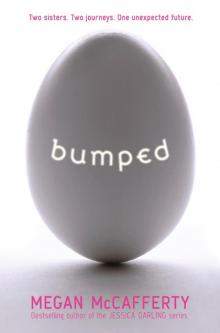 Bumped
Bumped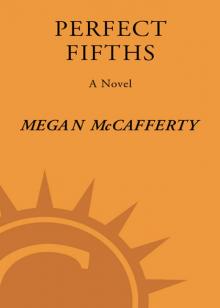 Perfect Fifths
Perfect Fifths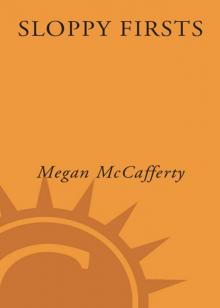 Sloppy Firsts
Sloppy Firsts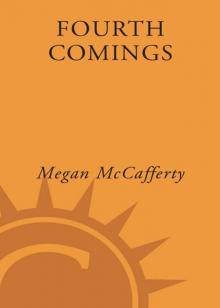 Fourth Comings
Fourth Comings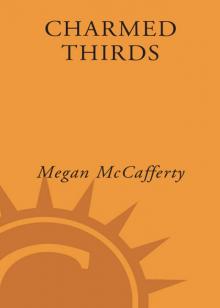 Charmed Thirds
Charmed Thirds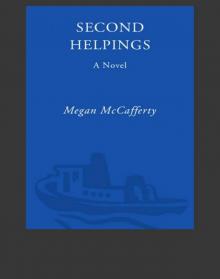 Second Helpings
Second Helpings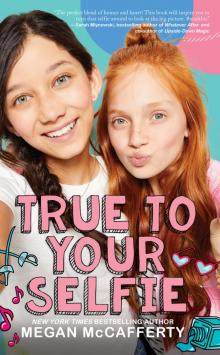 True to Your Selfie
True to Your Selfie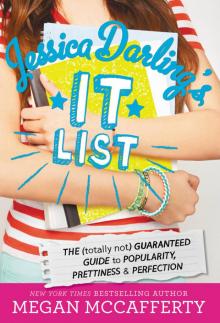 Jessica Darling's It List
Jessica Darling's It List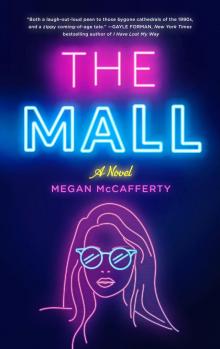 The Mall
The Mall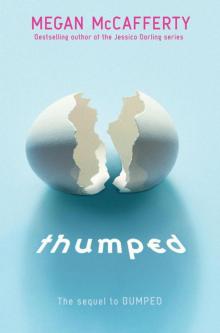 Thumped
Thumped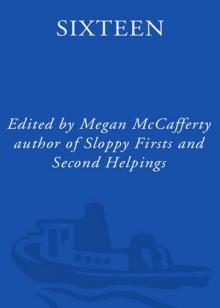 Sixteen
Sixteen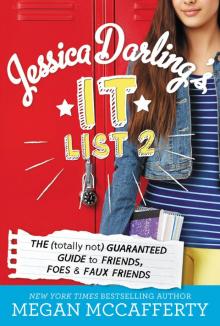 The (Totally Not) Guaranteed Guide to Friends, Foes & Faux Friends
The (Totally Not) Guaranteed Guide to Friends, Foes & Faux Friends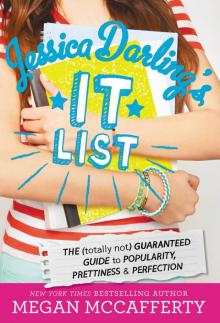 The (Totally Not) Guaranteed Guide to Popularity, Prettiness & Perfection
The (Totally Not) Guaranteed Guide to Popularity, Prettiness & Perfection